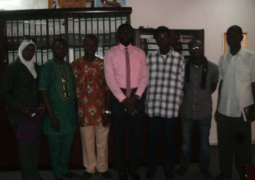Lawyer Ousainou Darboe the leader of the main opposition party, United Democratic Party (UDP) in The Gambia, has blamed public tap water sale on mixed priorities.
"If we have set priorities in our development program on issues and matters that need to be addressed urgently, we will addressed these matters once and for all", Mr. Darboe said, speaking in an exclusive interview with this reporter at his office in
Mr Darboe cited Farafenni and a village called Ndawen in the same area that are affected.
"I personally went to Ndawen and spent the night there and, honestly, in the morning, I could not even have water to wash my face. And Ndawen was the seat of the chief of Niani at that time.
"So I think Government really should get its act together to address issues that are of concern to the people, not white elephant projects like the rural electrification, when the rural people cannot even pay the bills for electricity because it is too expensive".
"No one will pay D6, 000 for a meter, when you cannot provide two bags of rice in your house. So the priority should be water supply. And I hope that both central and local government will address this issue urgently for us to make use of water in our various ways," he added.
According to Mr. Darboe, water is life. "We can't live without water under any circumstances. You can't even perform your religious rites correctly without water. So water is everything and it is regretting that in the 21st century Gambian people could buy water due to scarcity of water in a large settlement like Farafenni. Rural electrification program should go hand in hand with water supply for the rural areas. In fact, priority should be rural water supply rather than rural electrification."
He said that the local government authorities have a responsibility to ensure that water is available to the residents within their various local government administrative areas, adding that no Government, whether local or central government, is worth its salt if it cannot provide water for its citizens.
Concerning the remuneration of farmers for their produce, Mr. Darboe said "no one can deny that the biggest work force in this country is constituted by 'trade season, because they earn wages only once in year."
"Farmers are looking forward to their earnings after three to four months of hardwork in the field under the hot sun. At the end of the day, they want to realise the fruits of their hardwork and sweat", Mr Darboe added.
The farmers are not in a position to provide markets for themselves to sell their produce. They are not in position to even determine the prices for their own produce nor to create a viable market for them, Mr Darboe continued, further declaring that "all this should be provided for by the Government or probably with other stakeholders".
"It is unpardonable that after all this toil, the farmers should go without realising their wages. I know that in November, after a very good rain and harvest, the farmers were looking forward to having a very good trade season".
"So we are advising that whosoever is responsible for these marketing facilities should ensure that this year's trade season is not like past seasons, when farmers were left to go to the lumos to sell their produce. This was what I said in my New Year message. There should not be any owing them," he said.


